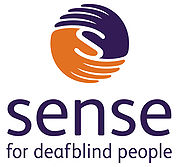
Sense-National Deafblind and Rubella Association
Encyclopedia

United Kingdom
The United Kingdom of Great Britain and Northern IrelandIn the United Kingdom and Dependencies, other languages have been officially recognised as legitimate autochthonous languages under the European Charter for Regional or Minority Languages...
that supports and campaigns for children and adults who are deafblind.
History
Sense was founded in 1955 as a self-help and support group for the parents of children whose disabilities were neither recognised nor provided for, children born deafblind as a result of their mothers catching rubellaRubella
Rubella, commonly known as German measles, is a disease caused by the rubella virus. The name "rubella" is derived from the Latin, meaning little red. Rubella is also known as German measles because the disease was first described by German physicians in the mid-eighteenth century. This disease is...
in pregnancy. It has since built a worldwide reputation for pioneering work by campaigning vigorously for change and setting up services wherever they are needed.
Vision
The charity’s vision is of a world in which all deafblind children and adults can be full and active members of society. It aims to work in partnership with others – deafblind people, their families, carers and professionals – to ensure that everyone challenged by deafblindness or sensory impairments has access to advice, opportunities and support.Deafblindness
DeafblindnessDeafblindness
Deafblindness is the condition of little or no useful sight and little or no useful hearing. Educationally, individuals are considered to be deafblind when the combination of their hearing and vision loss causes such severe communication and other developmental and educational needs that they...
is a combination of both sight and hearing difficulties. Most of what we learn about the world comes through our ears and eyes, so deafblind people face major problems with communication, accessing information and mobility. There are many causes of deafblindness; premature birth, birth trauma and rubella during pregnancy can all lead to babies being born deafblind. Some genetic conditions result in deafblindness, and it can also develop through illness, accident or with age. People who are born deafblind often have additional disabilities, including learning and physical disabilities.
Deafblind guidance
In March 2001, the Government issued statutory guidance about services for deafblind people and circulated it to Local Authorities with a Local Authority Circular document. A ‘quantum leap in deafblind services’ was how Sense’s magazine, Talking Sense described the issuing of the Guidance. The guidance was introduced as a direct result of pressure by a Sense campaign which called for a commitment to getting the right support for deafblind people enshrined in law.Activities
Sense provides specialist information, advice and services to deafblind people, their families, carers and the professionals who work with them. In addition, it supports people who have sensory impairments with additional disabilities.Specific services include help for families, day services where deafblind people can build confidence and learn new skills, and Sense-run houses in the community – where people are supported to live as independently as possible. Sense also provides specialist advice on issues such as education options and assistive technology
Assistive technology
Assistive technology or adaptive technology is an umbrella term that includes assistive, adaptive, and rehabilitative devices for people with disabilities and also includes the process used in selecting, locating, and using them...
, while Sense communicator guides offer a vital lifeline to deafblind people living in their own homes.
Sense is a member of the Learning Disability Coalition
Learning Disability Coalition
The Learning Disability Coalition is a group of fourteen organisations which campaigns to secure better funding for social care for people with learning disabilities in England....
, a group of 15 charities which campaigns for better funding for social care for people with learning disabilities in England.
Other information
Branches are groups of people who are interested in deafblindness and other associated disabilities who come together to offer each other mutual support. They can campaign for services and the needs of deafblind people, share information, experiences and ideas and have fun socialising together.Sense campaigns with deafblind people and their families. Sense supports deafblind people to campaign for themselves, is involved in European campaigning and undertakes campaigns on specific issues affecting older people, children and families.
Some deafblind people will use the support of a person known as a Communicator Guide. They act as the eyes and ears of a deafblind person and are trained to provide one-to-one communication support and guiding. The communicator guide's role is to provide practical help with every-day tasks such as shopping, dealing with mail.
Early intervention is vitally important for deafblind children. In the past, the age at which deafblindness is confirmed has varied widely. The introduction of Newborn Hearing Screening (for all babies) makes it much more likely that deafblind children will be identified when they are still very young babies.
Sense provides a range of support and advice in this area including: choosing the right school, supporting children with special educational needs and working with teaching professionals.
Sense organises holidays that give deafblind people the chance to get away from it all, taste new experiences and have a lot of fun! These holidays also give families a much-needed break from the often-demanding work of supporting a deafblind person.
Sense provides an advice service that is open to deafblind people, their families, professionals working with deafblind people and anyone who has a general enquiry about Sense or any aspect of deafblindness. Individuals who are looking for support or services will be put in touch with the appropriate Sense office. Enquires by telephone, textphone, email and letter accepted.
Sense has created a range of accommodation choices in the community to offer individuals the support they need to live as independently as possible and in the way that they choose.
Sense offers specialist assessments, advice and training on all aspects of working with deafblind and multi-sensory impaired people.

